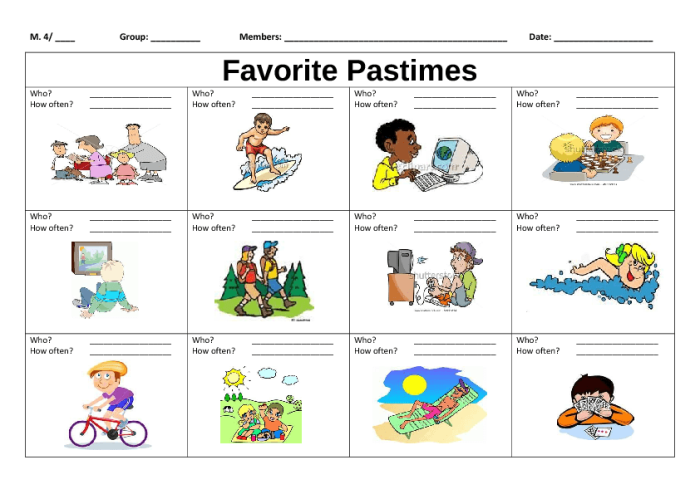Favorite Hobby: This exploration delves into the multifaceted world of leisure pursuits, examining their impact on physical and mental well-being, personal growth, and even financial prospects. From the quiet contemplation of a solitary hobby to the vibrant energy of a shared activity, we uncover the diverse ways in which hobbies enrich our lives. We’ll examine the psychological benefits, explore diverse hobby categories, and offer practical advice for discovering and sustaining fulfilling pastimes.
The pursuit of a favorite hobby transcends mere leisure; it’s a journey of self-discovery, skill development, and connection. This article examines the myriad benefits, from stress reduction and improved cognitive function to the potential for financial gain. We’ll categorize hobbies, offering examples across creative, physical, and intellectual pursuits, and provide actionable strategies for finding and maintaining a lifelong hobby that fuels personal growth and enriches daily life.
The Economic Aspects of Hobbies: Favorite Hobby

Hobbies, often viewed as leisure activities, possess a significant economic dimension, capable of generating income, supplementing existing earnings, or at least influencing personal finances in various ways. The financial implications range from minimal costs to substantial investments, depending on the hobby’s nature and the individual’s level of engagement. Understanding these financial aspects is crucial for both hobbyists seeking to maximize their enjoyment and those considering transforming their passion into a profitable venture.
Hobby Monetization Strategies
Many hobbies can be successfully monetized, transforming a leisure pursuit into a source of income. The methods employed vary widely depending on the specific hobby, but common strategies include selling handcrafted goods, offering services based on acquired skills, or leveraging online platforms to reach a broader customer base. Successful monetization requires a strategic approach, encompassing market research, pricing strategies, and effective marketing.
Financial Implications of Different Hobbies, Favorite Hobby
The financial burden associated with different hobbies varies significantly. For example, collecting stamps or coins might involve relatively low initial costs but could escalate with the acquisition of rare or valuable items. Conversely, hobbies like photography or woodworking often require substantial upfront investments in equipment, software, or materials. Membership fees in clubs or organizations related to specific hobbies represent another recurring cost.
The financial commitment should be carefully considered before embarking on any hobby, especially those with high entry barriers.
Examples of Monetizable Hobbies
Several hobbies lend themselves readily to monetization. Consider the case of artisanal baking. Individuals with a passion for baking can sell their creations at farmers’ markets, through online platforms like Etsy, or even by establishing a small-scale bakery. Similarly, skilled photographers can offer their services for events, portraits, or stock photography. The growth of online marketplaces has dramatically lowered the barriers to entry for hobbyists seeking to sell their work, creating opportunities for a wider range of hobbies to become income-generating activities.
The success of these ventures, however, relies heavily on factors such as product quality, marketing effectiveness, and the ability to manage business operations.
Cost Analysis of Hobby Participation
A detailed cost analysis is essential for responsible hobby engagement. This involves itemizing all expenses, including initial investments in equipment and materials, recurring costs such as membership fees or raw materials, and ongoing expenses like maintenance and repairs. For instance, a serious birdwatcher might invest in high-quality binoculars, field guides, and travel expenses to visit prime birdwatching locations.
A skilled woodworker, on the other hand, would need to account for the cost of woodworking tools, wood itself, and potentially workshop space rental. By meticulously tracking these expenses, hobbyists can better manage their budgets and ensure that their chosen pastime remains financially sustainable.
Ultimately, the pursuit of a favorite hobby is an investment in oneself. Whether it’s crafting intricate designs, conquering challenging hikes, or mastering a complex skill, the rewards extend far beyond the activity itself. The benefits – physical, mental, emotional, and even financial – underscore the importance of dedicating time to activities that bring joy, promote growth, and contribute to a richer, more fulfilling life.
The key is to discover what sparks your passion and to cultivate that passion consistently.

